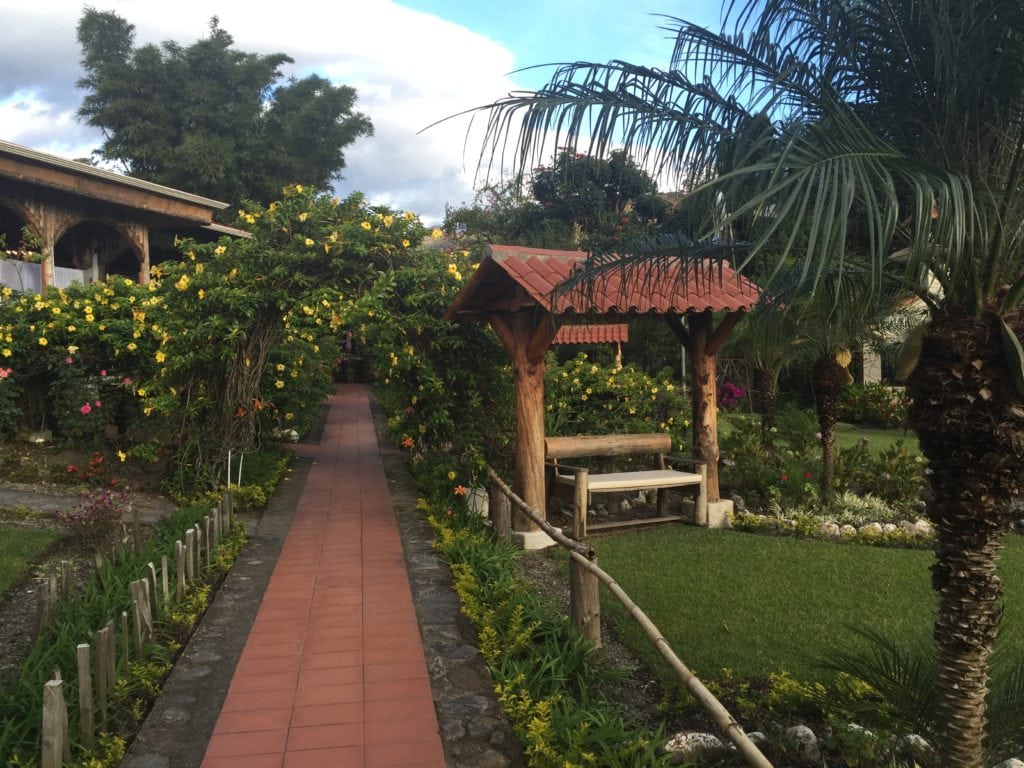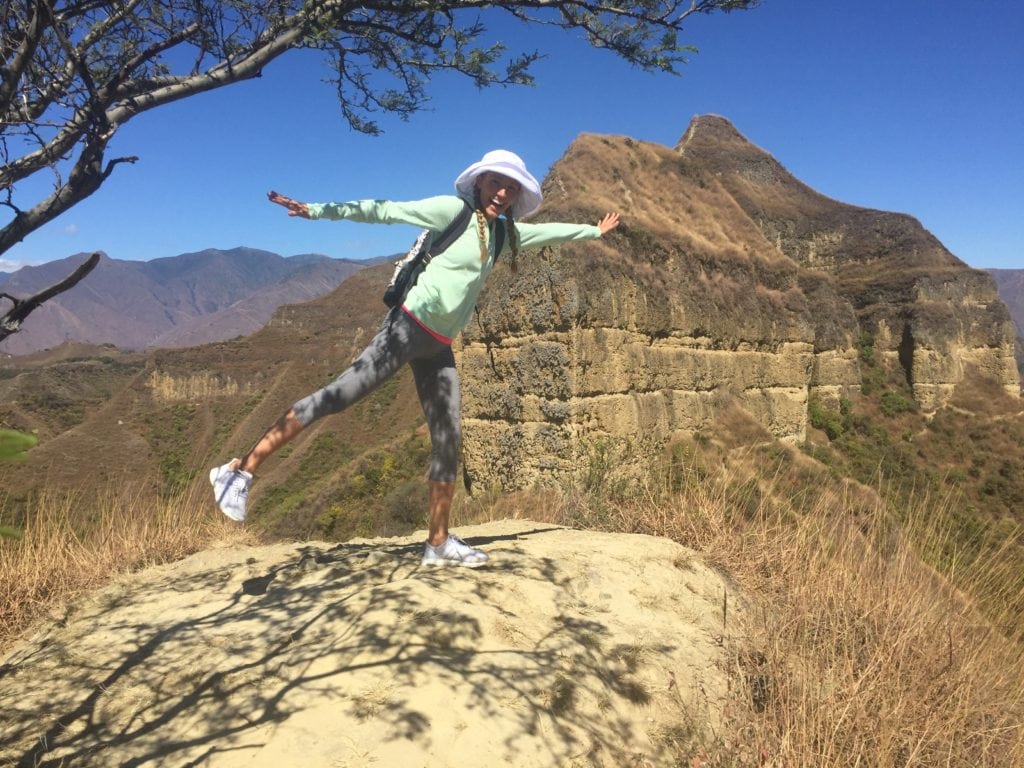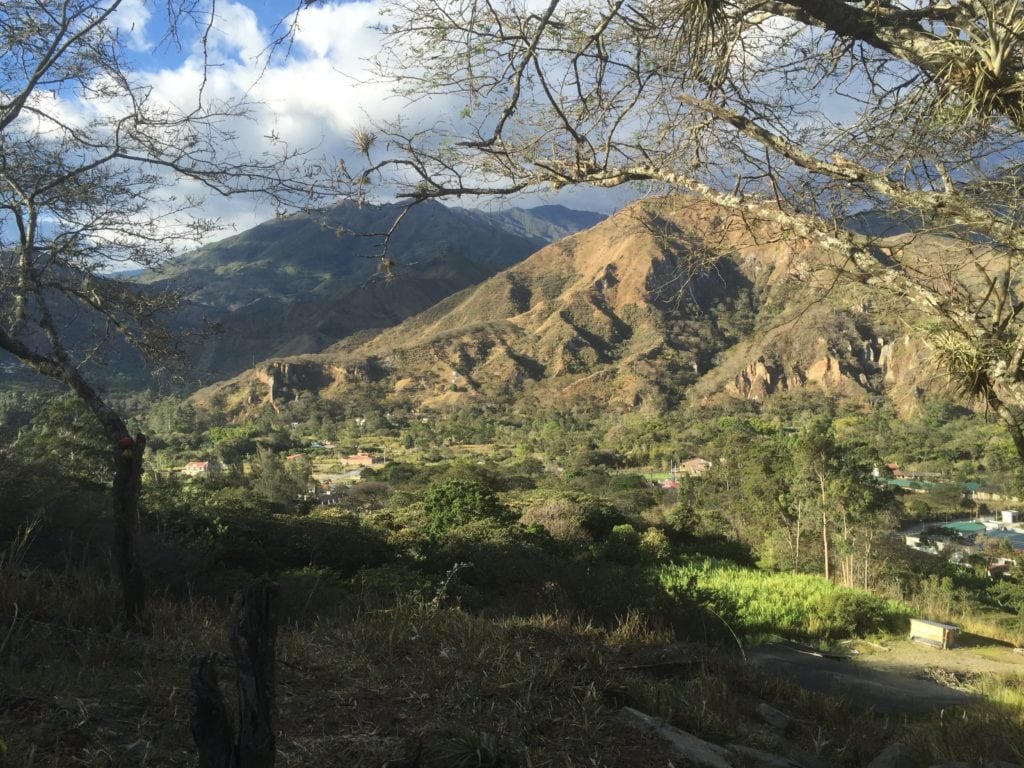When I started studying in Milano, I left all my “juvenile” spontaneity and curiosity behind. I started living a very programmed and predictable life in order to accomplish all of my planned goals. I never even thought that I would now, as a mother, decide to revive that spontaneity and embark on a beautiful adventure, by myself. Why not? After all, we’re always by ourselves. The sooner we accept that, the easier we’ll be able to live with others.
With support from my closest friends, I began my journey over the ocean to a small village also known as the Valley of Longevity. My route was pretty long: London-Miami-Guayaquil-Loja, then a three-hour car ride to my final destination – Vilcabamba, Ecuador. I spent 30 hours traveling, slept on a bench at the Guayaquil airport while waiting for my connection because the plane from Miami was five hours late. I felt like a teenager! There, a pretty little adventure on the road already.
I stayed at a guest-house of a wonderful Russian family and had no regrets. There was so much warmth, love, care and respect given to a stranger. I guess I’m only used to getting that kind of treatment from the fellow Serbians. Most of the local inhabitants live in very harmonious relations.
Vilcabamba is a special place. Everyone told me that people either love that village or they run headfirst. The ones who stay are mostly the ones who want to return to the basic values of life, to turn to nature. All that can be found in Vilcabamba. People there are mostly Americans and Canadians who are fed up with corporations and the reality TV scene. They start communities with their own rules, and whoever wants to live there, must contribute to the community by helping in the garden and animal farming, along with building houses with natural materials. They are all in sync with nature. They all are filled with love and respect towards other members.
I’ve met interesting people with specific life quests and stories.
Yves, two dogs, a cat and the greedy Edison
Yves is a forty-year-old who bought an arid piece of land on a mountain two hours walk from Vilcabamba 13 years ago. He did this in order to create a small community, which would recover the land. He lived by a set of rules: the land mustn’t be accessible by a car, it mustn’t have electricity, it should be close to a mountain water spring and it has to be infertile. He vowed then, with his girlfriend at the time, to devote the next 15 years of his life to that land and make it fertile for plant and animal farming. In 15 years, he promised, he would leave that piece of land to the community, and continue traveling all over the world and support similar initiatives.
His girlfriend left him after only two months of living in a tent. He was alone.
“I sat on the mountain, with my two dogs and my cat. I gazed upon beautiful sunsets and sunrises and had a marvelous view, and everything that came to my mind was that I have completely lost my mind, and who cares about the view. This is so hard! Hands full of blisters from digging, sunburns, back pain… what was I thinking?!” said Yves.
Since he had made a vow and committed to recovering the land, he continued his adventure. He named it Sacred Suenos – Sacred Dreams. Luckily, lots of young people from all around the world came to volunteer in his community and help him build the houses. Now, his community consists of eight members and many volunteers who stay a week or two, some of them even staying the entire summer. Some give up in just a few days, and some give up while climbing the mountain… Two hours of mountain climbing is a strenuous challenge, especially with bags and backpacks. No wonder some of them give up before they even climb the mountain.
A few years ago, some philanthropists supported his vow and helped him buy additional adjacent land. Now, the community has two projects – growing organic fruit and vegetables, making goat cheese, but also reading books and creating technological inventions. Here, people glorify the work of Nikola Tesla and try to replicate some of his ideas, while blaming the system that such an innovative genius couldn’t get the attention and respect of the world while he was alive. Thomas Edison on the other hand? They call him “the greedy one.”
Yves left Canada when he finished his advanced studies, and now he can’t go back, due to the fact that he refuses to pay his tuition loan to the bank. When he needs money for some projects in the community, he teaches English or travels to California, where he works on marijuana plantations illegally.

Hippies, shaman, and a very peculiar shoemaker
The second community I visited is a hippie-community founded by an American, Tom Osher, who changed his name into something short and intelligible –Mofwoofoo. It is a bit of a wealthier commune. The land they live on is in Vilcabamba, next to the Ciamba River. He named his communion Shambala, but then he changed it to Ciamba la Bamba. There’s a stage for parties and acrobatics, a studio for music recording, a small lake with a sandy beach, a school for children without teachers, orchards and vegetable gardens. They even grow spirulina! They either live in tree-houses or in Indian huts. They mostly don’t have windows, since the weather is so nice during the whole year so they just don’t need them.
Ten years ago, this village was one of the most attractive villages to people who wanted to spend their retirement in a place with lovely weather, healthy nature and low prices for quality food. But, when the International Travel magazine published a report on this village, the locals raised the price of land, and now, it’s not that cheap to buy a house in Vilca anymore. However, people still come.
People often organize “Raw Food Retreats” – camps where people eat raw food only, which grows well over the year. They have coffee, cocoa and banana plantations, as well as coconut trees, avocados, oranges, ginger, pineapples, kiwi, and pomegranates.
People also come for their own spiritual journeys. Various shamans live in the village, and some even offer a potion named ayahuasca, with a special ritual. When people drink it, they enter a state of trance and hallucinate, since their senses are very sensitive. Some people have stated that they experienced communication with angels and other higher life forms. Many who try to take a shortcut to a divine place take ayahuasca. The experience is not remotely pleasant, for it is followed by diarrhea and vomiting (the motive behind it is parasite cleansing). People in Vilca are saying that shamans have even sexually abused women who come to that ritual, because, when they take that potion, they lose control over their bodies for the next six hours.
I had a very pleasant experience with a shaman called Carlitas. He is an artist and paints frescoes and icons in churches, as well as private houses of wealthy Ecuadorians. I spent a few hours with him, talking about his skills and their use. He was very kind and polite. When he watches people, he said, he watches them very shyly, because he can see many things even he himself doesn’t want to see, and probably those people don’t want to show them to him either. He spoke to me in Spanish, I spoke to him in Italian, and we understood each other well. He can interpret mandala, so he understood a drawing I had made that morning. He talked to me about the openness of my chakras, and gave me advice on removing some energy blockades through meditation.
Then I met a shoemaker named Paulo. He’s originally from Venice, and he embarked on the journey around the world thanks to his culinary skills. He worked in restaurants as a pizza chef, but that didn’t fulfill him.
“Everybody fought and hated each other in the kitchens I once worked… The food we made was full of such energy. I couldn’t take it. I wanted to go somewhere and try living on raw food, in harmony with nature and the environment. And all my roads led to Vilcabamba,” said Paulo.
Besides changing his diet and profession (he became the local shoemaker), he embarked on a spiritual adventure and started making “silent retreats” named Vipassana. You meditate for ten days, ten hours a day, without any communication with other people. You only eat breakfast and nothing else. During that period, he is devoted to inner peace, life in the present moment and being thankful for everything that surrounds him. I was completely swept away by his devotion. He went as many as 29 times to do those meditations. The math is easy – he didn’t speak for 290 days in total! There were times when he would make four Vipassanas in a row! It was particularly astonishing with him being Italian, they tend to be pretty chatty.

An escape from the world and guinea pig diet
While strangers come to spiritual journeys and deal with healthy life, the locals are still trapped in an age we surpassed twenty years ago. A year and a half ago, they got their first Internet connection, but they’re not too “obsessed” with world events. No airplanes fly over Vilca, and you lose three hours for every trip – so they don’t care much about the dealings outside their village.
Calling Vilca a village would be condescending. In fact, Vilca is a widespread community. I often spent my summer vacations with my grandma’s and grandpa’s, in a village of about 3,000 inhabitants, while Vilca has as much as 7,000 inhabitants and a constant influx of new people. Nature, however, is so lush and beautiful, you don’t even feel the presence of people.
Not until 20 years ago did they have so much processed food packed in plastic packaging, and their diet was pretty healthy. Everything they’d eat, mostly fruit and vegetables, they’d throw away on the ground because it was biodegradable, so they never developed a habit of throwing litter in a garbage can. Now, when they eat chips, sweets, conserved food and drinks, they still throw everything on the ground, believing in the concept of biodegrading. Even on buses, you can see signs like “Don’t throw away the garbage on the bus. Throw it through the window.” Seeing a driver slinging a bag full of garbage through the window, on the road, while moving, is not a rare sight.
They still believe that a big stomach is a reflection of “wealth” and not of inappropriate diet, so men, women, even dogs proudly “wear” their obesity. They affectionately call them “gordita” (which translates to “a plump girl” in Spanish).
I was astonished by the fact that the Ecuadorian specialty is grilled guinea pig. While we buy them for our kids as pets, they serve them as a gourmet specialty. I really had no intention of trying that.
Truth be told, they don’t eat many animal products. They mostly eat raw food from their gardens, seeds, and nuts. One taxi driver complained about how the first pharmacy shop in the village opened some ten years ago when foreigners started coming. Before that, they used herbs and teas for medication and lived simple lives, so they rarely got sick. Now they have access to alcohol and processed food, so the consequences in form of diabetes, obesity and cardiovascular problems are more and more obvious.
Few people have a car of their own. That’s a luxury because of high taxes and import fees; that’s why everybody commutes in taxis or buses, which are inexpensive. As a result of the lack of cars, there is consequently little to no air pollution. There are also no cinemas or theaters, and no shopping malls. There are also only a few restaurants, which I didn’t visit. Honestly, I had no need to, because I had plenty of choices in the garden of the house I stayed in.o
A typical day of an inhabitant consists of working in the garden or field, and around the house. Some farm chicken, goats or cows. They often sell meat by the road, on tables or on a wire, but it’s consumed once a week, not more than that.
What’s fascinating is that so many of them use “compost” toilets. They use all the manure as a fertilizer for their gardens, and they also degrade their food with sodium bicarbonate and use it as a fertilizer. When they see horse or donkey dropping by the road, they feel happy and collect it for their gardens.s
They even practice the concept of “hen tractors” in some communities: while hens strut on the yard, they claw the land and thus turn it over as tractors do, only without polluting the environment. They also relieve themselves and thus fertilize the land. They first enclose them in a small part of the land and leave them to “work,” and then eventually move them around the field. If you don’t mind the clucking – there’s plenty of benefits from these feathery workers.
Tourists can ride horses in the mountains or rent bikes. I went to a small zoo that had just a few cages – small monkeys, an ostrich, birds of peculiar looks, and that was it. Children play in the streets or in the backyards. They also have a large football field and an outside gym. Young people mostly go on long walks in the mountains or by the river to swim. The weather is nice the whole year, so they never have to be inside. They also watch films, instead of going to cinemas. When someone asks them if they want to travel – most of them say they’re happy in their village. The guy who drove me once said that he would probably like to visit Tuscany someday, but that he is happiest when he’s home.

Endless greenery and a spiritual uplift
Vilca is surrounded by the Andes from all sides. Its altitude is 1,500 meters and the temperature varies from 18 to 28 degrees Celsius during the year. When I traveled to Ecuador, I looked for an accurate weather forecast for Vilcabamba, but since there’s not a single meteorological station in the village, I didn’t get it. I prepared for rain and temperatures between 13 and 22 degrees, which was a big mistake.
I spent two beautiful weeks at 27 degrees Celsius, with a lot of sunshine, and not enough shorts.
After just a few days in Vilca, I went on a conquest of the Mandango mountain-top, also known as the “Sleeping Inca.” When you look at the mountain from afar, it does look like a pharaoh sleeping. The mountaintop itself seems incredible, like a secret Inca temple, unnaturally and supernaturally attached to the mountain.
The Podocarpus National Park stretches along a large part of the Andes surrounding Vilca, and one day, I went from the sunny Vilca by car, to get closer to the Andes from the other side of the Amazon jungle, so I could see the magnificent waterfalls. It takes three or four hours minimum for every trip via very bad and curvy roads. The Amazon rainforest is rich with rains and a cooler climate, so I gave up on the primary plan of swimming at the waterfall. It was magnificent. There was such a lovely and peaceful energy. The dark-green trees and plants, along with a bunch of orchids surrounding you. The greenery is lush and immensely green. A complete rest for your eyes and soul.
I closed my eyes and let myself go to the sounds of nature. I heard everything: the rain, the waterfall, the leaves’ rustle and the birds… And the butterflies! I saw so many beautiful butterflies, in all colors! Those are all untouched rainforests where microbes originating from the ice age live.
At the highest point of the park stands a Tundra with 14 lakes filled by melted glaciers. They say that “glaciers’ milk” contains metal colloid minerals. During the rain season, the lakes overflow and all the water flows through the Tundra and descends to the waterfalls. When it reaches the valley, the locals collect it and use it for personal use. Hence, they proclaimed that the Vilca water is one of the cleanest and healthiest waters in the world – that’s one of the reasons this valley is considered the Valley of Longevity.
Every day had its own charm. It’s not a typical place for a vacation, especially because it’s so hard to reach. To me, it contained everything I wanted, and I made beautiful friendships I want to maintain with great love.
A lot of people asked me if I had gone on a spiritual journey, but my spiritual journey and growth have no special destination or determinant. It happens everywhere, all the time.
In Vilcabamba, I had more time for myself and my needs, because there the concept of time doesn’t exist. I used my phone only as a camera. It was on only when I could find a Wi-Fi connection. In that sense, I was spiritually uplifted, because I didn’t have any distractions of a technological nature. I had plenty of time to work on myself, my beliefs, to get some sleep, read lots of books and recharge my battery. I came back filled with love and energy, which I selflessly share with my family now.
Every journey is a chance to learn something new about other people, but also about ourselves. I wanted to be immersed in nature, without the burden of names and expectations. I found that there. Could I have found that somewhere closer? Oh, yes! I have it in me now, and I don’t plan to lose it. I carry the peace I found on this journey everywhere, and I can find it anywhere now: in every city, village or country. My peace lives in me and depends on me.
I want the same for all of you. The sooner we find a way of being in harmony and love with ourselves, the easier it will be to live in a harmonious community with others.


4 comments
Jelena, this is wonderful! I was enjoying every word of this story. Thank you for sharing this!
U protekle dve godine uspela sam toliko toga da vidim i doživim i zahvalna sam na tome. Putovanja su mi otvorila oči za mnoge stvari. Tvoja priča je predivna i radujem se svakoj sledećoj.
Pozdrav, Jovana.
Vrlo lijepo napisano.❤️
Boda
Wonderful narative of what you lived in Ecuador. as Venezuelan, a would like to invite you to visit our unbeatable Amazon. you’ll see spectacular views of our tepies, the angels fall, homeble people. A beautiful journey.
Procitavsi ovu predivnu pricu,stekla sam utisak da sam i sama posetila Ekvador.Polako ucim da i sama nadjem svoj mir.Jedva cekam sledecu pricu.S velikim postovanjem pozdrav!